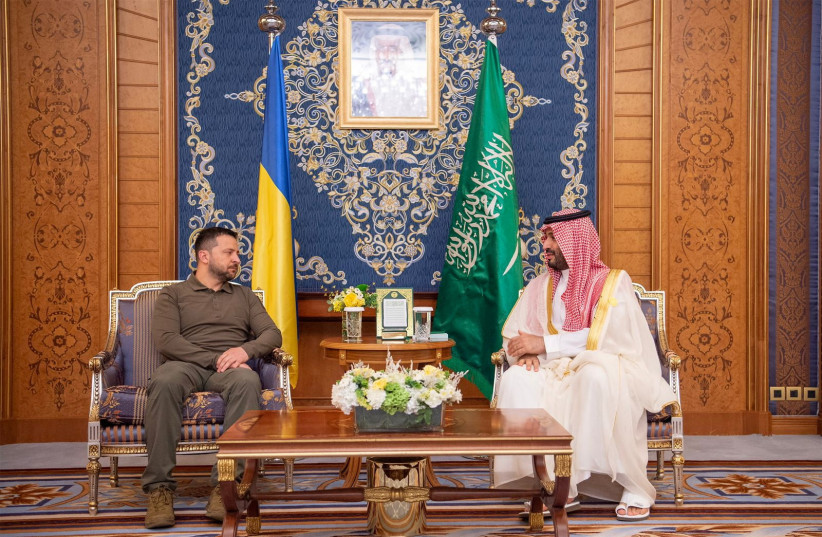In his opening remarks at the Arab League Summit in Jeddah, Saudi Arabia on Friday, Saudi Crown Prince Mohammed bin Salman welcomed Arab leaders, Ukrainian President Vladimir Zelensky, and then Syrian President Bashar al-Assad who was readmitted into the organization after 12 years of estrangement.
While Russia’s client was readmitted into the ranks of the Arab League, Putin’s adversary was given a platform to make his case in front of the Arab world. Welcome to the new Middle East.
Syria’s return to the Arab League during the summit in Jeddah has been criticized as a Saudi-led push to “rehabilitate” Syrian President Bashar al Assad, the leader of a fractured Syria who oversaw the slaughter of half a million of his countrymen and the displacement of 11 million under Russian air cover and the guidance and tactical command of Iranian Revolutionary Guards commanders and militias on the ground.
Those critics fail to appreciate the reality of the order that is being born in the region, absent the sheltering American security umbrella that friends and foes had accepted as a fact of nature for the past half-century. Whether America’s leaders and the wise men of Davos are right or wrong to bet on the impending disappearance of fossil fuels as a strategic resource, the region has received the message loud and clear: Elvis has left the building.
Since countries can’t be moved as easily as oil tankers and warships, regional leaders are left with no choice but to try and build a modus vivendi -- even if that means eating dinner together with war criminals.

Through brute force, and the unwavering support of his patrons, Russia and China, Bashar al Assad has managed to prevail in his war against his own people, delivering a strategic victory to the Russia-Iran axis that will allow him to preside indefinitely over a tattered and fractured Syria.
Giving Syria a place at the table is a recognition of a reality that the Syrian dictator has forged out of steel and blood. It is also a victory for his patrons who facilitated his murderous behavior. It is reasonable to expect that future would-be Arab strongmen are paying close attention to these ugly lessons.
President Zelensky is also in Jeddah. The presence of a staunch Russian adversary and symbol of democracy in the Kingdom for the Arab League summit at the same time as Bashar al-Assad illustrates the other side of a new Middle East. While initiatives led by US allies focused in the past on maintaining the US security order, this Arab League summit brings together a region that can no longer be easily divided into well-marked camps policed by superpower patrons. The most notable feature of this new landscape is a competition for influence, power and resources that is open to all players.
While open competition is not in itself a bad thing, the prospect of a regional free-for-all carries considerable risks – both to American interests and to regional stability. Without clear alliances and rules, the threat of armed conflict can only increase.
Lack of US strategy leaves power vacuum
Meanwhile, the United States lacks a coherent strategy to manage its own remaining, quite large interests in the region. Even if the long-term American goal is simply to erase the region from the maps of US military and economic planners, departing in a haphazard and piecemeal way is a recipe for increasing chaos that will negatively impact American interests while damaging the region in ways with likely global effects, and not simply local.
Beijing has capitalized on the power vacuum left by the United States, most recently by brokering an agreement in Beijing between Riyadh and Tehran. The enmity between those two capitals is based mostly on Iran’s perception of Saudi Arabia being an agent of the American order in the Middle East.
Absent that order, why should there be enmity? While the Iranians have reneged on agreements many times in the past, Chinese guarantees introduced a new level of confidence for the Saudis. At the same time, the Chinese clearly lack the American ability to back up their commitments with force.
Saudi Arabia’s reestablishment of diplomatic ties with Syria does not mean the Kingdom condones the crimes committed in that country, any more than it is now aligning itself with either Teheran or with Beijing. Instead, Saudi Arabia realizes that absent a coherent US-backed security architecture in the region, senselessly making pariahs of regional actors – whoever they are – makes little strategic sense.
US allies are not pivoting away from America. Instead, they are pursuing their own national interests. Nothing illustrates the new realities of the Middle East better than the Saudi Kingdom hosting both Vladimir Zelensky and Bashar al-Assad in the same room in Jeddah. Both the opportunities and the dangers of a region that is being left to manage its own problems and rivalries, without superpower guarantees and guidance, could not be more clear.
This article was first published by Al Arabiya English.
Mohammed Alyahya is a senior fellow at the Harvard Kennedy School’s Belfer Center for Science and International Affairs.
